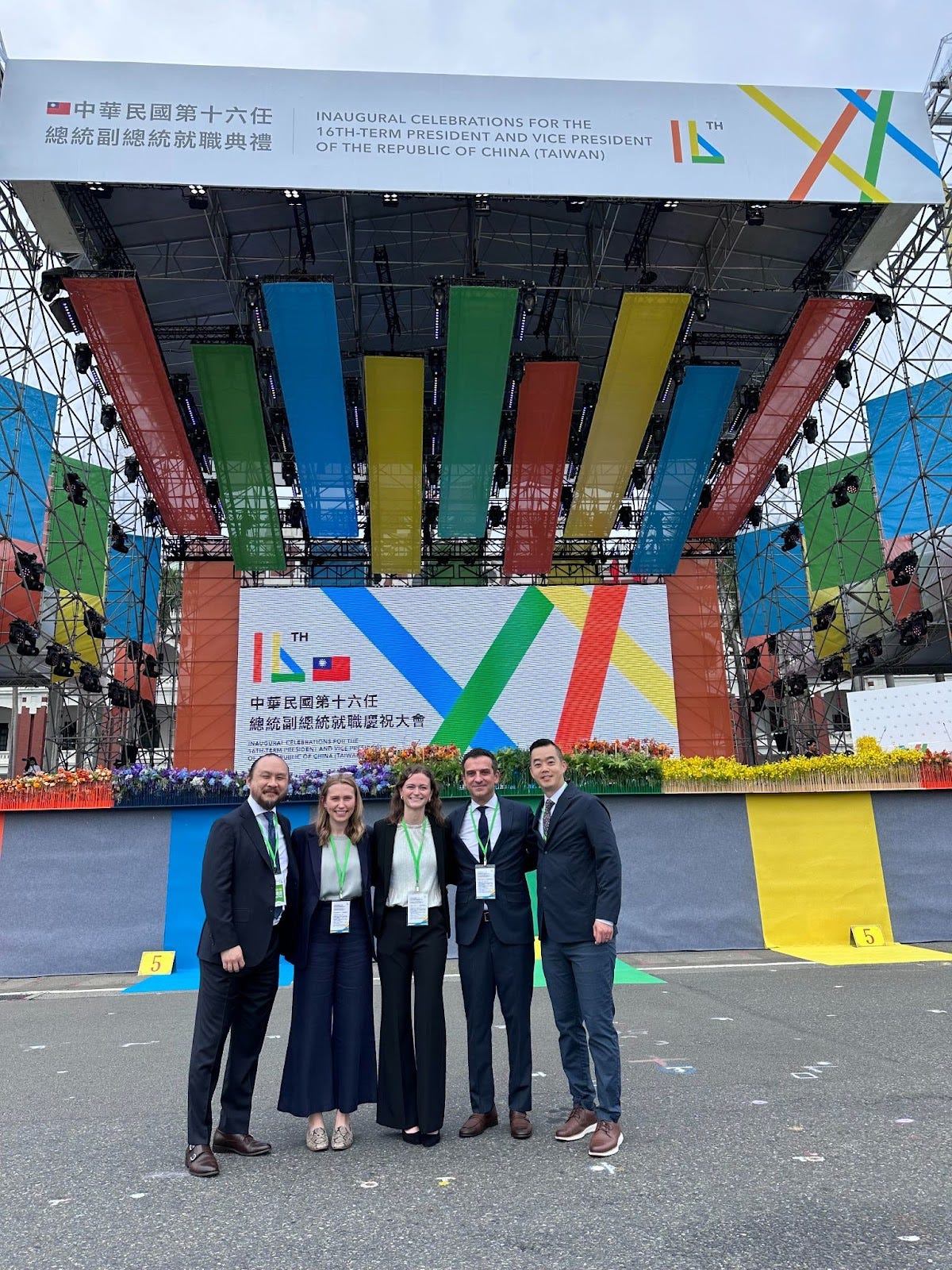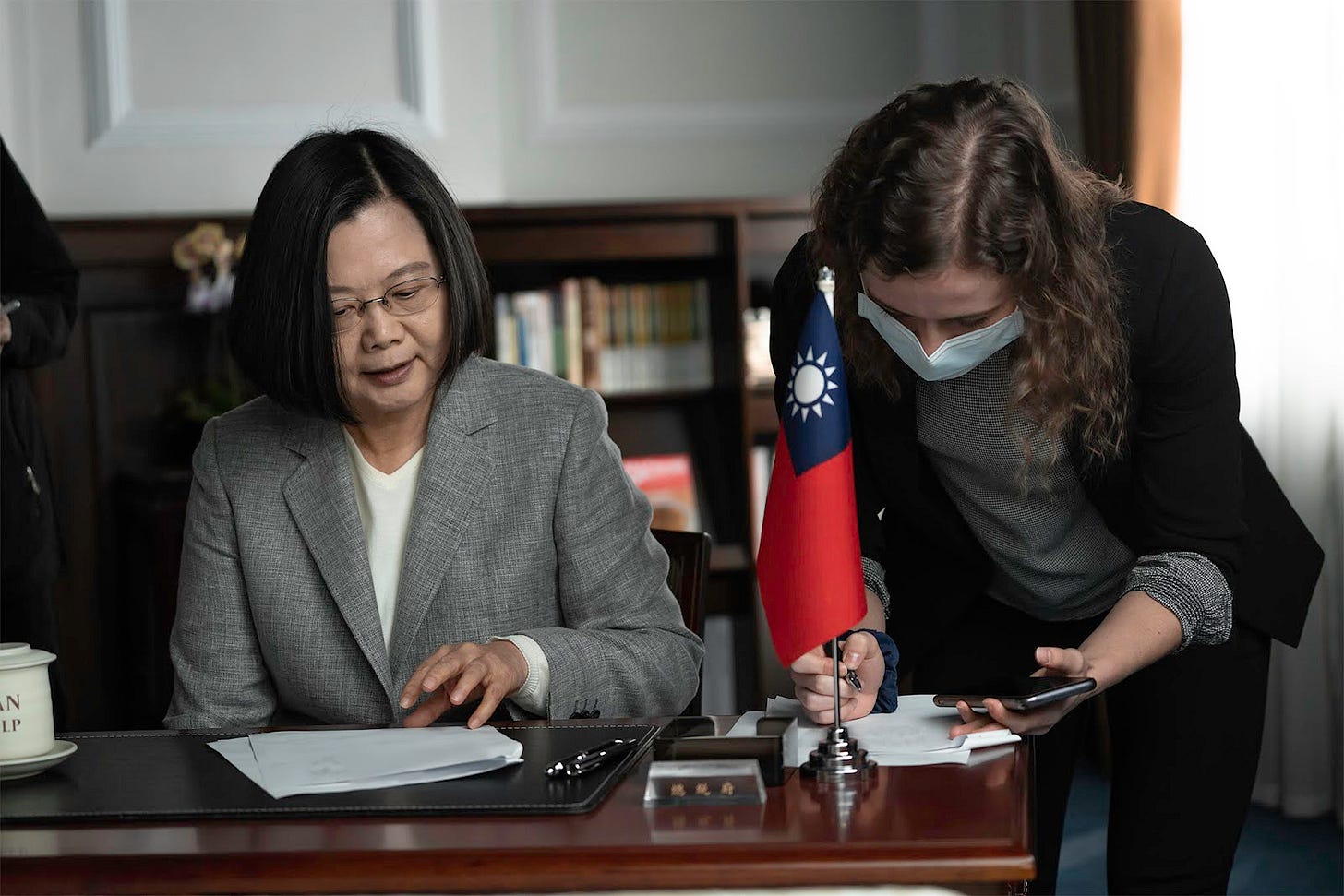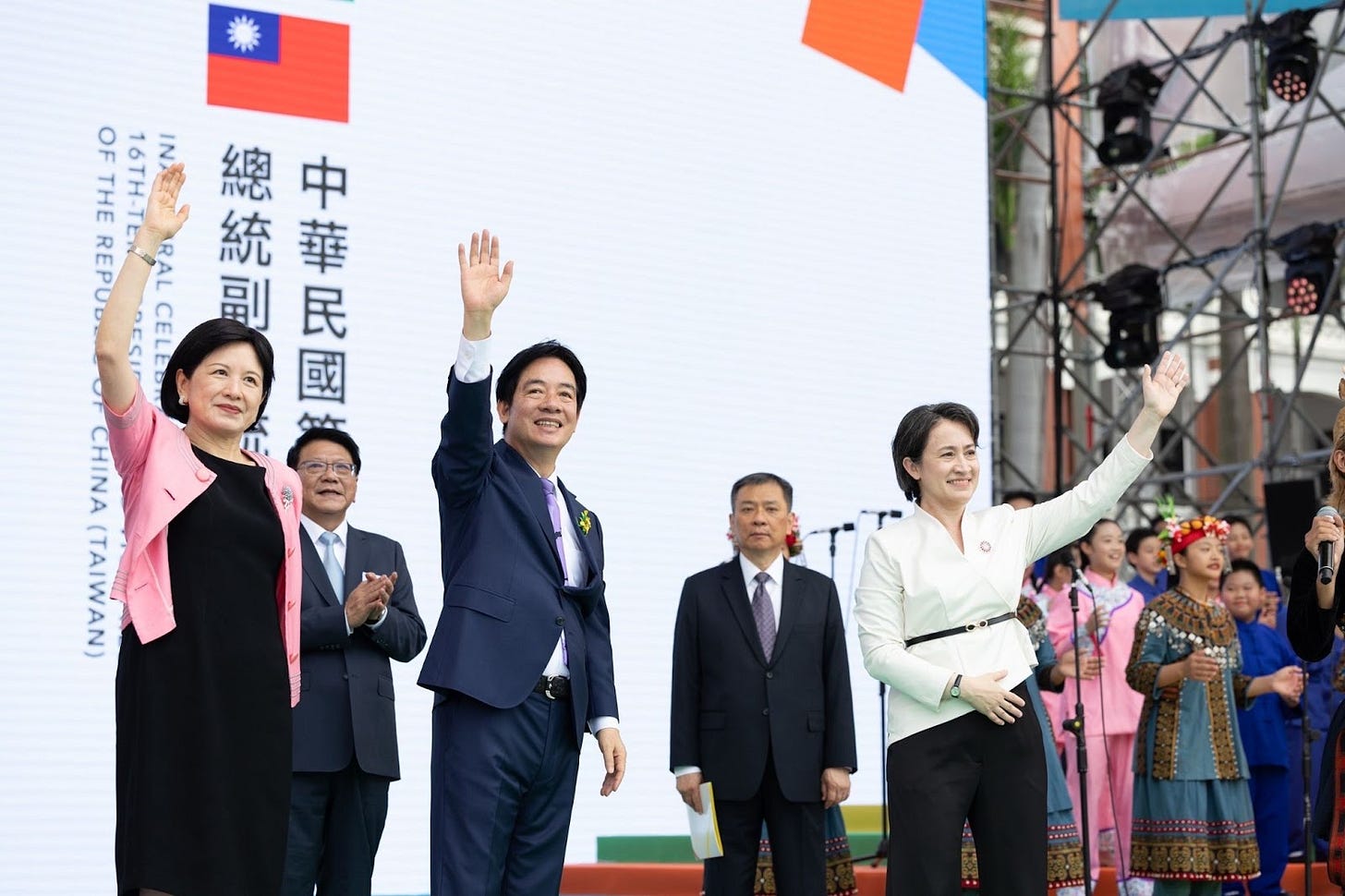The View from Taiwan: Democracy in Action
Hello, I’m Ylli Bajraktari, CEO of the Special Competitive Studies Project. In this edition of 2-2-2, SCSP’s Libby Lange shares some of her takeaways from our recent trip to Taiwan for the inauguration of President Lai Ching-te as well as her experience working for former President Tsai Ing-wen as her lead English-language speechwriter from 2018 to 2020.
Last week, we released our Vision for Competitiveness: Mid-Decade Opportunities for Strategic Victory. This document is inspired by NSC-68 and advocates for the strategic deployment of emerging technologies to enhance national defense and secure U.S. interests. The report articulates what winning the tech competition could look like, and what specific actions we must take. We invite you to read and share our Vision here.
We are also excited to share with you the first of many videos from the AI Expo for National Competitiveness and the Ash Carter Exchange.
The View from Taiwan: Democracy in Action
Despite growing concerns about democratic backsliding around the world, Taiwan continues to reach new milestones in its democratic journey. In January, the Taiwanese people voted to elect President Lai Ching-te, the first time in the history of the island’s democratic elections that the same party has held power over three consecutive terms. Voters were unswayed by Beijing’s overt and covert attempts to influence their decisions, demonstrating their belief in Lai’s vision for Taiwan’s path forward.
Taiwan is a critical link in the global coalition of democracies as we work to maintain our techno-economic edge over the Axis of Disruptors. In late May, a team from the Special Competitive Studies Project traveled to Taiwan to attend President Lai’s inauguration. We met with leaders in government, civil society, and academia who generously shared their insights on U.S.-Taiwan relations, global technology competition, and China’s regional ambitions.
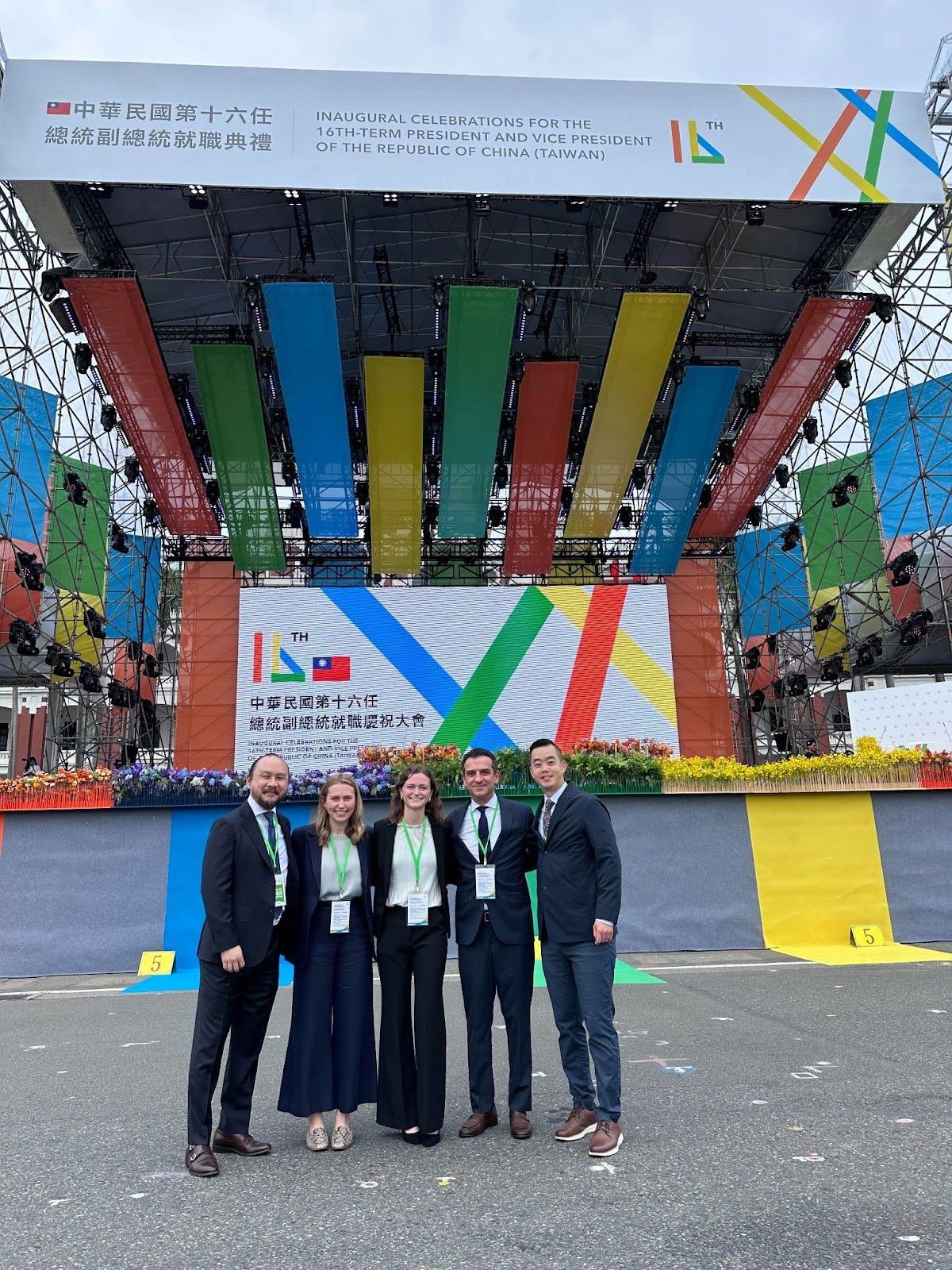
My Time in Taiwan
This trip was particularly meaningful for me due to my own connections to Taiwan. In 2012, I participated in an exchange program that allowed me to spend a year at a Taiwanese high school in Taoyuan, just south of Taipei. I was fascinated by Taiwan’s political situation and realized I needed to learn more to fully understand the dynamics at play. I decided to apply directly for an undergraduate program in political science at National Taiwan University. Although the program was taught almost entirely in Chinese, I welcomed the challenge. In my admissions essay, I remember writing that I wanted to act as a “bridge” between the United States and Taiwan. I hoped to share my experiences growing up in a small town in Iowa, but more importantly, I wanted to bring what I learned back to the United States to inform a better understanding of Taiwan. This has remained my guiding principle, even here at SCSP.
Following graduation, I had the opportunity to work with former President Tsai Ing-wen as her lead English-language speechwriter from 2018 to 2020. It was an incredible honor to support her steadfast leadership through the often turbulent waters of cross-strait relations. Through my work with President Tsai, I also witnessed the tireless work individuals across Taiwanese society invested in securing their democratic way of life, and how these efforts have changed Taiwan’s place in the world bit by bit. Whether it’s diplomatic personnel working around the clock to advocate for greater participation for Taiwan in international venues, civil society organizations fortifying Taiwan’s cognitive security, or technical experts hardening Taiwan’s digital resilience, there is no question that the Taiwanese are doing their part to secure the frontlines of democracy. Below, I share some takeaways from our time in Taiwan.
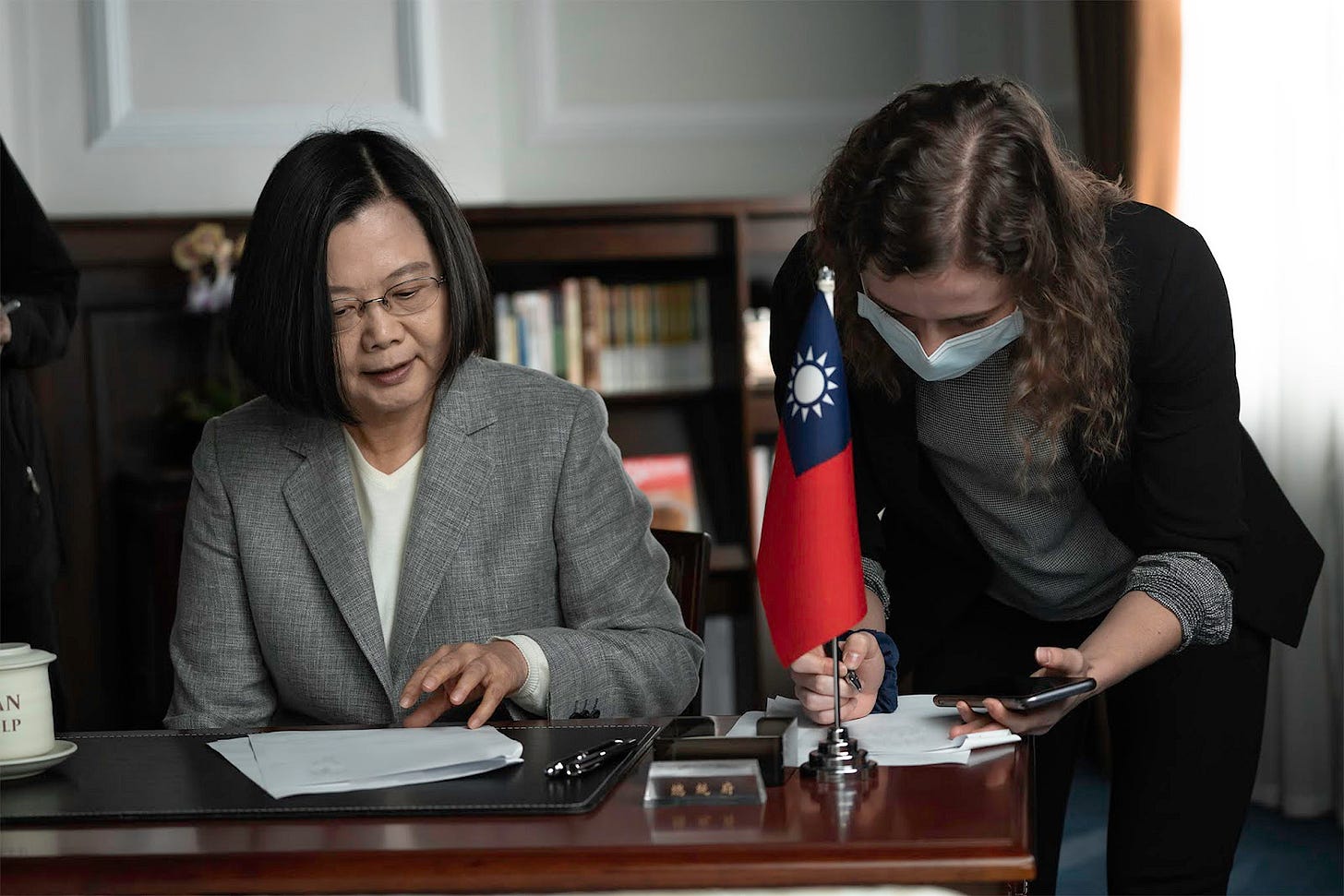
Beyond a “Silicon Island”
Policymakers in Taiwan recognize the pivotal role of technological advantage in security and prosperity. In his inaugural address, President Lai announced his goal of transforming Taiwan into an “AI Island.” Lai described AI as a catalyst for the fortification of Taiwan’s workforce, military, and economy, the kind of positive vision for AI applications that we at SCSP believe enables technological success. He also outlined priority industries such as quantum computing, precision medicine, and aerospace technologies. Such initiatives would meaningfully kickstart Taiwan’s software ecosystem, which has long lagged behind its hardware production capabilities. Perhaps more importantly, President Lai specified that Taiwan seeks to play a key role in trusted, democratic supply chains. This values-based approach aligns with SCSP’s own Vision for Competitiveness to secure the United States’s innovation power. Taiwan would be a prime candidate for the kind of enhanced techno-economic partnerships between democracies that SCSP envisions.
We also saw evidence of this push to foster a Chinese-language software ecosystem rooted in democratic values at our AI Expo in Washington, DC in early May. There, the Taiwan AI Center of Excellence hosted an event debuting for international audiences their TAIDE model. Trained using traditional Chinese-language data, TAIDE could serve as a trusted resource for Chinese-language users free from potential bias that could come from training on data sourced from China. This type of ingenuity is just one of the ways Taiwan is adapting to the increasingly multi-domain struggle to safeguard democracy in our tech-enabled world.
“Taiwan Needs the World, Just as the World Needs Taiwan”
Taiwan’s creativity and resilience extend far beyond technology. This was apparent in inaugural performances celebrating pride in being Taiwanese, sung in local languages once banned under martial law. It also showed through in the presence of dozens of students from Hualien, where Taiwan’s strongest earthquake in 25 years hit in April. Although lives were tragically lost, world-class earthquake preparedness prevented larger-scale destruction. As the world braces for the impacts of climate change, expertise like this will be invaluable. This is the Taiwan I hope the international community can come to see, a Taiwan that has so much more to offer than just its technological prowess.
At the same time, the public and private sectors also need to think creatively about how to engage with Taiwan across multiple fronts. We are already seeing encouraging signs in this direction. Since 2019, 12 U.S. states have established representative offices in Taiwan to bolster trade and investment ties. Last November, Taiwan signed its first trade framework deal in Europe with the establishment of an Enhanced Trade Partnership with the UK, a likely Comprehensive and Progressive Agreement for Trans-Pacific Partnership (CPTPP) signatory. And in the past two years, the Biden administration has marked a variety of firsts in the methods and types of security assistance authorized for Taiwan. The willingness of governments around the world to continue finding new ways to bolster ties with Taiwan proves what one expert told us during our time there: democracies have more stamina to stick together in times of need than autocracies can hope to muster.
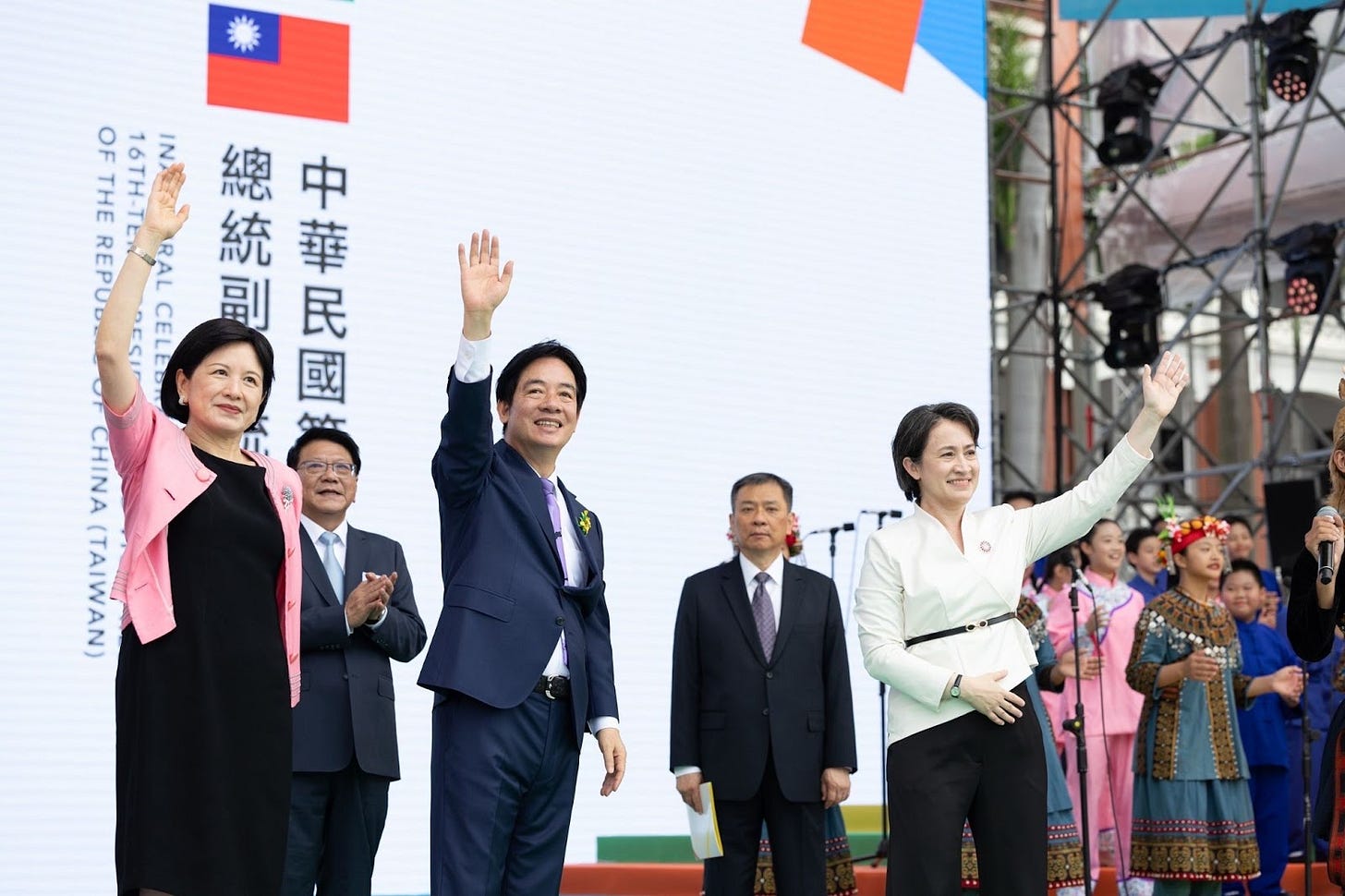
The Road Ahead
These reflections are not meant to give the impression that Taiwan’s democracy is perfect. Many challenges still remain ahead for the Lai administration and Taiwanese society. While we were there, large-scale protests broke out against proposed legislation that critics warned could undermine separation of power and increase Taiwan’s vulnerability to Chinese influence. Proponents contend it would do the opposite.
Despite the still unclear outcome of the legislation and the backlash it inspired, the incident offers a powerful contrast to authoritarian alternatives. Just over a week after the protests in Taiwan, Hong Kong courts convicted 14 pro-democracy activists of conspiracy to commit subversion under the territory’s new national security law, with a maximum sentence of life in prison. The ability of the Taiwanese people to safely, organically make their voices heard shows us exactly what we are defending when we support Taiwan.
On Threads - which has become hugely popular in Taiwan - I watched as people discussed how to efficiently distribute resources to protesters on the ground, shared protest songs recorded in multiple languages with the help of AI, and updated audiences on where and how protests were taking place. Many of them took part in the Sunflower Movement protests of just 10 years ago and described what it was like to become “democratic grandparents” supporting a new generation of democracy activists. Regardless of the outcome of the protests, they offered the opportunity to pass down these experiences and knowledge, an invaluable asset for the challenges to come.
Since returning to the U.S., I find myself often thinking of a scene I saw on our final morning in Taiwan. As advocates were beginning to set up their equipment and signage outside the Legislative Yuan, people drove by on scooters heading to work. One middle-aged man waiting at the stoplight turned towards the group and saw one of their signs. Almost immediately, he began shouting the slogan as loudly as he could from his scooter, drawing confused looks from other commuters and applause from the activists already there. He continued encouraging the protestors until the light turned green and he sped away. For me, this moment captured Taiwan’s democratic spirit in miniature: each person doing what they can, no matter how much or how little, to ensure a free, democratic future for generations to come. We would do well to take this lesson from Taiwan, because as President Lai himself said, “If we are united, we can walk with more confident strides. And when we support one another, our steps will take us further.”
Below is a translation in traditional Chinese:
台灣視角:民主的實踐
您好,我是特別競爭研究計畫(SCSP)的執行長Ylli Bajraktari。在這期2-2-2中,SCSP的Libby Lange分享了她最近隨行SCSP團隊前往台灣參加賴清德總統就職慶典的一些心得,以及她從2018年到2020年擔任前總統蔡英文英語演講稿撰寫人的經歷。
上週,我們還發布了《競爭力願景:十年中期戰略勝利的機遇》。這份文件的靈感源於NSC-68報告,主張戰略性部署新興技術來增強國防和確保美國利益。該報告闡述了贏得技術競爭可能的樣貌,以及我們必須採取的具體行動。我們邀請您點擊此連結閱讀並分享我們的願景。’
我們也很高興與讀者分享第一批來自「國家競爭力AI博覽會」(AI Expo for National Competitiveness)和艾希頓·卡特交流會(Ash Carter Exchange)的影片。請訂閱我們的YouTube頻道,以確保在影片發布時收到通知!
台灣視角:民主的實踐
當全球對民主倒退的擔憂日益增長時,台灣卻在其民主道路上繼續達到新的里程碑。今年一月,台灣人民投票選舉了賴清德總統,這是該島民主選舉歷史上首次出現同一政黨連續三屆執政的情況。選民們未被北京公開和暗中影響他們決定的企圖所動搖,展現了他們對賴清德帶領台灣前進的願景的信念。
在全球民主聯盟努力維持對「破壞者軸心」的技術經濟優勢時,台灣是關鍵一環。五月底,來自特別競爭研究計畫的團隊前往台灣,參加賴清德總統的就職慶典。我們與政府、公民社會和學術界的領袖會面,他們慷慨地分享了他們對美台關係、全球技術競爭以及中國區域野心的見解。
我在台灣的時光
由於我個人在台灣的經歷,這次旅行對我來說特別有意義。2012年,我參加了一個交換計劃,讓我在桃園縣的一所台灣高中度過了一年。我對台灣的政治情況非常感興趣,但同時也意識到我需要學習更多來充分理解其中的動態。我決定直接申請國立台灣大學的政治學系。儘管課程幾乎全部以中文授課,我仍欣然接受這一挑戰。在我的入學申請文件中,我寫道我希望成為美國和台灣之間的「橋樑」。我希望分享我在愛荷華州一個小鎮長大的經歷,但更重要的是,我想把我在台灣學到的帶回美國,促進美國人對台灣的理解。這直到現在在SCSP工作時仍然是我的指導原則。
畢業後,我便有機會到總統府工作,2018-2020年擔任前總統蔡英文的首席英語演講稿撰寫人。能夠在兩岸關係時常動盪時支持她堅定的領導力是我畢生的榮幸。在總統府工作時,我也見證了台灣社會各界為確保他們的民主生活方式而投入的不懈努力,以及這些努力如何一點一滴地改變了台灣在世界中的地位。無論是日夜不停地為台灣在國際場合獲得更多參與空間而奔走的外交人員,還是鞏固台灣認知安全的公民團體,或是強化台灣數位韌性的技術專家,毫無疑問,台灣人正在盡自己的一份力,守衛民主的前線。以下為我們這次台灣行程的心得。
不只是「矽島」
台灣的決策者認知到技術優勢在安全和繁榮中的關鍵作用。在就職演說中,賴清德總統宣布了他將台灣轉變為「人工智慧之島」的目標。賴清德將AI描述為強化台灣人力、軍事和經濟的催化劑,這正是SCSP認為能夠促進技術發展成功的正面AI應用願景。他同時也概述了優先發展的產業,如量子電腦、精準醫療和太空技術。這些舉措能夠有意義地啟動台灣一直落後於其硬體生產能力的軟體生態。或許更重要的是,賴清德總統明確表示,台灣希望在可信賴的民主供應鏈中扮演關鍵角色。這種基於價值的作法與SCSP的《競爭力願景》為確保美國的創新力的建議相一致。台灣是SCSP設想的民主國家之間加強技術經濟夥伴關係的理想選擇。
在5月初於華盛頓特區舉辦AI博覽會時,我們也看到了這種推動植根於民主價值的中文軟體生態的實踐。在會場上,台灣人工智慧卓越中心舉辦了一場活動,向國際觀眾首次展示TAIDE模型。使用繁體中文資料訓練,TAIDE可以作為一個可信賴的資源,為中文用戶提供免於來自中國資料訓練潛在偏見的服務。這種創新精神是台灣在我們技術驅動的世界中,適應日益多領域的民主保衛鬥爭的方式之一。
「臺灣需要世界,世界也需要臺灣」
台灣的創造力和韌性遠遠超出技術範疇。這點在就職典禮表演中明顯可見,例如歌手以曾在戒嚴時期被禁止的本土語言歌唱,表達對身為台灣人的驕傲。也通過數十名來自花蓮的學生的出席而體現,花蓮在4月遭遇了台灣25年來最強的地震。儘管有多位民眾不幸傷亡,但台灣世界級的地震防護措施防止了更大規模的破壞。隨著世界為氣候變遷的影響做準備,像這樣的專業知識將是無價的。這就是我希望國際社會能夠看到的台灣,一個不僅僅擁有科技實力的台灣。
同時,公共和私營部門也需要創造性地思考如何在更多方面與台灣交流。在這方面,我們已經看到了令人鼓舞的跡象。自2019年以來,美國有12個州在台灣設立了辦事處,以加強貿易和投資聯繫。去年11月,台灣與英國簽署了《提升貿易夥伴關係協議》,是台灣在歐洲的第一個貿易框架協定,而英國也可能成為《跨太平洋夥伴全面進步協定》(CPTPP)的簽署國。此外,在過去兩年裡,拜登政府在授權給台灣的軍事援助的方法和類型上都有新的突破。世界各地政府繼續尋找新方式來鞏固與台灣的關係,證明了一位台灣專家在我們訪問期間告訴我們的話:民主國家在艱困時團結的耐力,比專制國家所能啟動的更為強大。
前方的道路
以上的反思並非旨在給人一種台灣民主是完美的印象。賴清德政府和台灣社會仍然面臨著許多挑戰。我們在台灣時,發生了大規模抗議,反對一項批評者警告可能會破壞權力分立並增加中國對台灣影響力的草案。支持者則認為會產生相反的效果。
儘管該法案及其引發的社會反彈的影響尚未確定,這一事件與威權主義替代方案形成了強烈對比。就在台灣抗議活動發生一週後,香港法院根據該地區的新國家安全法,以串謀顛覆國家政權罪名判處14名泛民主派人士有罪,最高可判無期徒刑。台灣人民能夠安全並有機地表達自己的聲音,向我們展示了當我們支持台灣時,我們在捍衛的正是什麼。
在已在台灣非常流行的Threads上,我看到人們討論如何有效地向現場的抗議者分配資源、分享透過AI以多種語言錄製的抗議歌曲,並更新遊行發生的地點和方式。這些人中,有許多曾參與了僅10年前的太陽花學運,描述了成為支持新一代民主份子的「民主阿公阿嬤」是什麼感覺。無論這次抗議的結果如何,它提供了傳遞這些經驗和知識的機會,這對台灣社會即將面臨的挑戰來說是一筆寶貴的機會。
自從回到美國後,我經常想起在台灣最後一個早晨看到的一幕。當倡議者開始在立法院外設置他們的設備和標語時,隔壁街的人們騎著機車往工作地點駛去。一位中年男子停下來等紅綠燈時,轉向那群人,看到了他們的一個標語。他立即開始從機車上盡可能大聲地喊出口號,引起了其他通勤者的困惑眼神和已經在那裡的抗議群眾的掌聲。他繼續鼓勵抗議者,直到綠燈亮起,並飛速離開。對我來說,這一刻正是台灣民主精神的縮影:每個人都盡自己所能,無論多或少,確保子孫後代享有一個自由、民主的未來。我們應該從台灣學習這一課,因為正如賴清德總統自己所說,「團結一致,我們的腳步就更穩;相互扶持,我們的足跡就更遠。」






